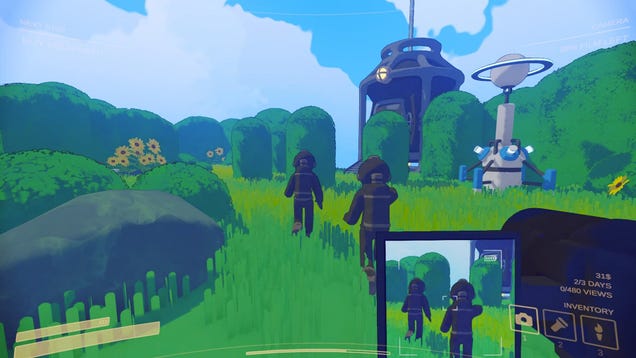In middle school—stop me if you’ve heard this before—I knew a group of guys that loved to do stupid, reckless shit. They likened themselves to the cast of Jackass, but it wasn’t good enough to do said stupid shit, like walking between train stations via the train tunnels. They needed to be able to share it with their friends, and maybe even the world. So they did what lots of kids in the early 2010s did and started uploading their hijinx to YouTube. They didn’t get famous off of these stunts, but I did just look up their crew’s name and surprisingly enough, some of their videos are still up—so they managed to capture their dumb fun for future generations to enjoy.
Fallout’s Michael Esper On Being ‘Obsessed’ With The Series, Luigi, And More
That idea of capturing the idiocy that happens between you and your friends is the main thrust of one of gaming’s newest trending topics, Content Warning. Content Warning, which shadowdropped last week and was available for free on Steam the entirety of its first day, has not quite taken the world by storm, but it has sold admirably well and made my timeline a bit sillier. In it, you and your friends are influencers who drop into nightmare settings filled with monsters and record yourselves getting terrorized. Should you manage to escape, your video gets cut together for you to playback and upload to a fictional site—the game provides a handy tool to immediately save these clips to your actual desktop for you to share on real social media platforms—and you earn money that goes towards buying more equipment to use in the field.
Its premise isn’t entirely unlike Lethal Company before it, or even Phasmophobia, two multiplayer games where your party is expected to go into places that are menaced by monsters or otherworldly creatures. Games like these often lack progression systems (save for Phasmophobia, which added it later) and a lot of industry standard features that incentivize people to keep playing towards some designed goal. It makes them seem, in a word, simple. The conventional thinking is that these are games that’ll come and go in the blink of an eye.
Depending on who you ask, simple is the best thing a game could be or the worst. I love dense games like systems-heavy immersive sims and content-heavy titles like Destiny 2. But I’ve also played about two hours of Content Warning, where the extent of what you do is scream into a mic at your friends, record it all, and play it back for you all to look back on and laugh. They’re all equally memorable and deserve merit.
Playfulness comes in all kinds of shapes and sizes and so much of what we do in and around this industry is try to capture it. It is as present in the labyrinthine complexities of something like Baldur’s Gate 3 as it is in the act of pointing a camera at a friend doing a backflip in Content Warning.
And Content Warning digs into this primordial manner of playing that I miss, that we so often lose as we age. I don’t often yearn to be a tween, but remember how fun it was to have no responsibilities and the world at your fingertips? Remember the joy of gathering your friends and playing tag or the thrill of running through the woods at night? Content Warning’s premise pokes fun at how our society has commodified antics we’d take part in as kids, but underneath that satire is a virtual playground to make and capture tales just like those. It allows me to be those Jackass kids from middle school, even if only for a few hours a week.
Since it released, I’ve seen several dumb clips of friend groups enjoying the hell out of Content Warning. I’m part of a few of them! It may be simple, but maybe people miss that, Maybe that’s exactly what they need. I may never play Content Warning again, but I’ve had honest, laugh-out-loud fun with people I love in it, and I got to capture that to share with others. I get to look back on that and remember how fun it is to just holler things and run in the right company. If I were to abandon the game right now, the simple fun of Content Warning would have already done more for me than I expected at first glance.
I’m not a fool. Content Warning isn’t suddenly challenging the ephemeral and fleeting nature of the joy of living nor is it fixing what I believe to be fundamental issues surrounding playfulness in this current incarnation of the games industry. The clips Content Warning saves are sitting on devices and social media platforms that’ll die off and decay. This shit isn’t forever. One day, those kids’ videos will be scrubbed from YouTube for one reason or another and the phones they captured that footage on have long been abandoned. But Content Warning is a window into something simpler, and that’s pleasant to be a part of, even ever so briefly. It has given me the chance to go back, even for a moment, and be a kid again. Be someone detached from “content” and roadmaps, and in-game marketing events. It wants to capture joy as best it possibly can, and I wouldn’t give that up for anything.

